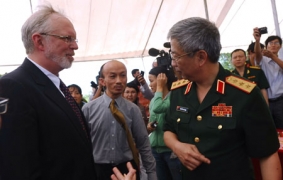
Vietnamese General Nguyen Chi Vinh (R), Deputy Defense Minister, speaks to the US Ambassador to Vietnam David Shear as they attend the ground-breaking ceremony of the joint US-Vietnam Dioxin Cleaning Project held at the a former US airbase in the central city of Da Nang on August 9. Photo: AFP
This group has met annually since 2006 to provide scientific advice to the governments of Vietnam and the US on dioxin cleanup strategies for former US military bases in Vietnam, and research involving human health issues related to Agent Orange/Dioxin (AO/dioxin) exposure.
Two statements attributed in the press release to US Ambassador to Vietnam, David B. Shear, provide hints of a possible policy shift in the US’s view on the relationship between AO/dioxin and resulting health consequences for Vietnamese people exposed to this toxicant.
During the two-day meeting, Ambassador Shear “highlighted progress made in bilateral cooperation to help Vietnam respond to environmental and health challenges related to Agent Orange …” He also stated: “This project is a significant milestone in our joint efforts to address the legacy of Agent Orange in Vietnam.”
Since the termination of hostilities between the US and Vietnam, that is, over the past 37 years, successive US administrations have consistently chanted the mantra that no scientifically-proven link exists between the exposure of Vietnamese people to AO/dioxin and any human-health related consequences… that is, no cause and effect relationship exists.
This position was certainly one of the reasons no assistance to Vietnam was forthcoming from the US all these years addressing, specifically, human health and the dioxin equation.
I am somewhat perplexed by the fact that no journalist has posed very obvious questions to the US, and in particular Ambassador Shear, regarding, what is to me, glaring inconsistencies in US policy.
If I was in a position to pose questions to Ambassador Shear, I would ask him:
“Sir, you have said the JAC meeting has highlighted progress related to environmental and health challenges associated with Agent Orange. The environmental challenge is self-evident throughout southern Vietnam, in the devastation of once lush tropical forests and wildlife. However, the ‘health challenges’ you refer to are another matter.
“If you profess there is no evidence that AO/dioxin exposure in Vietnam has compromised the health and wellbeing of local populations, as has been consistently maintained by US administrations, why is there a ‘health challenge’ that must be addressed? What is the challenge you are referring to if your administration does not accept a cause/effect relationship of exposure and health issues?
“You also mention that the JAC has made significant efforts to address the legacy of Agent Orange in Vietnam. I presume the ‘health consequences’ you mentioned earlier are part of this legacy.
“So how do you reconcile this legacy with your government’s long-held stance of no proven cause/effect relationship, which has been advanced historically to justify not assisting Vietnam?
“Has the US finally accepted there is a full and legitimate cause/effect relationship? If not, why are you investing significant US dollars in the cleanup of former US military bases contaminated with dioxin? Do you still deny that dioxin has been a significant factor in compromising the health of exposed Vietnamese people?
“What has moved the US away from decades of denial, obfuscation, and inaction? I am certain the US administration did not wake up one morning and say ‘it is time to do the right thing.’ Basically, why is the US offering to assist Vietnam with their AO/dioxin problem now, when it has been ignoring emphatic calls for responsible action from Vietnam and the international community at large for decades. What has changed?
“How would you respond to reports that suggest China’s growing influence in the region is a factor, possibly the primary factor, in guiding the US administration to invest in dioxin cleanup activities in Vietnam; that the real aim is to gain a valuable ally in the geo-political structure within the region?”
If the Ambassador denies the geo-political rationale, the issue of cause and effect of dioxin exposure takes the spotlight. Acceptance of a definitive cause/effect relationship places the US in a precarious situation regarding liability. Why is the US offering financial aid to address a problem that it has for long maintained does not exist?
It is possible that Vietnam is welcoming US involvement without dwelling on specific reasons for it. Having the US as an ally in the face of China’s aggressive territorial claims is, basically, not a negative circumstance, from their perspective.
By Dr. Wayne Dwernychuk
The writer is an environmental scientist in British Columbia, Canada. The opinions expressed are his own
Source: thanhniennews.com






